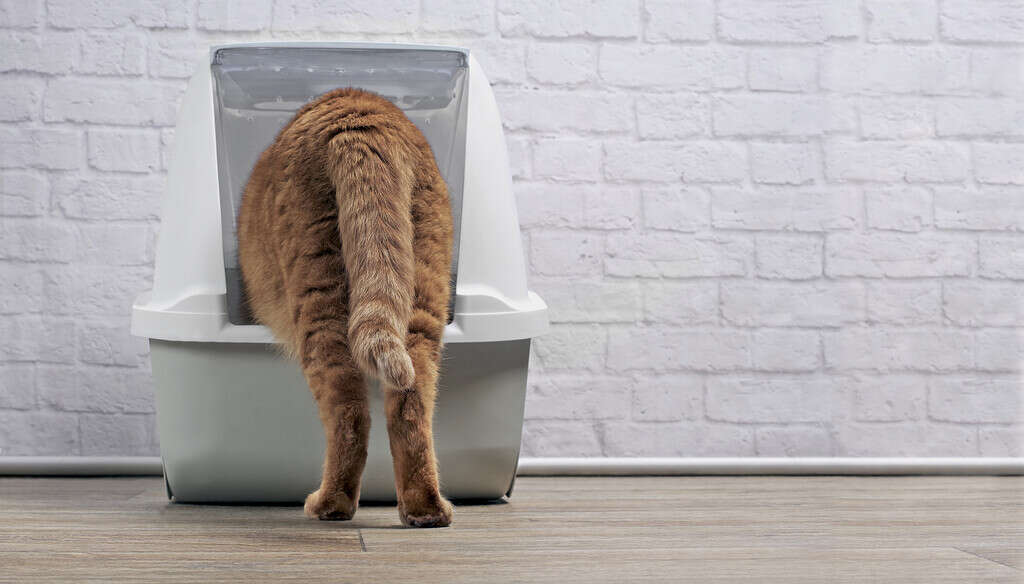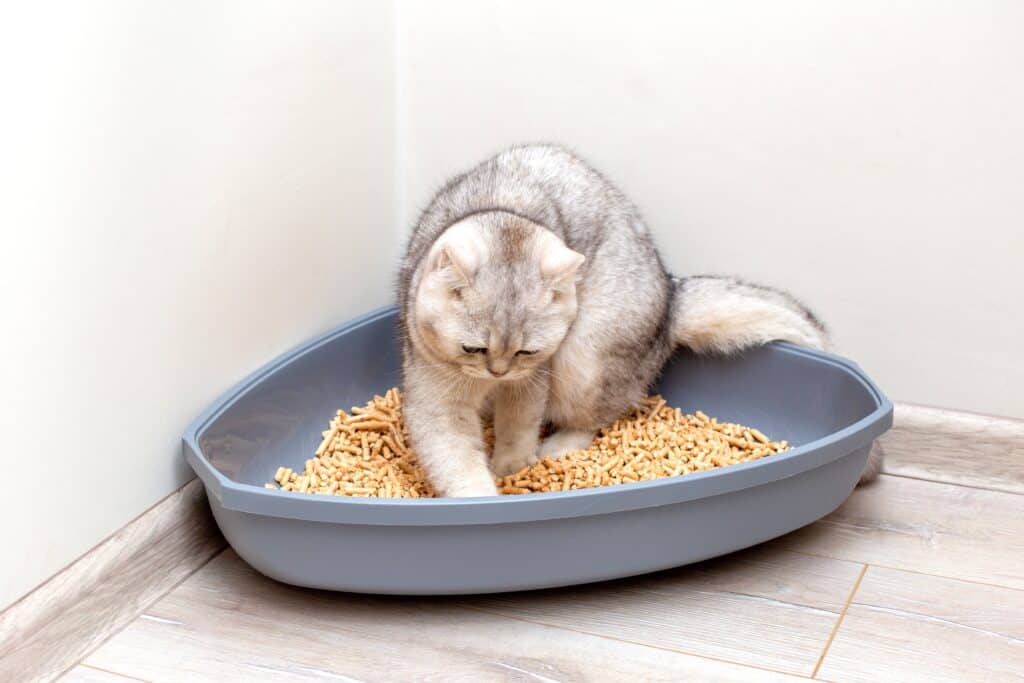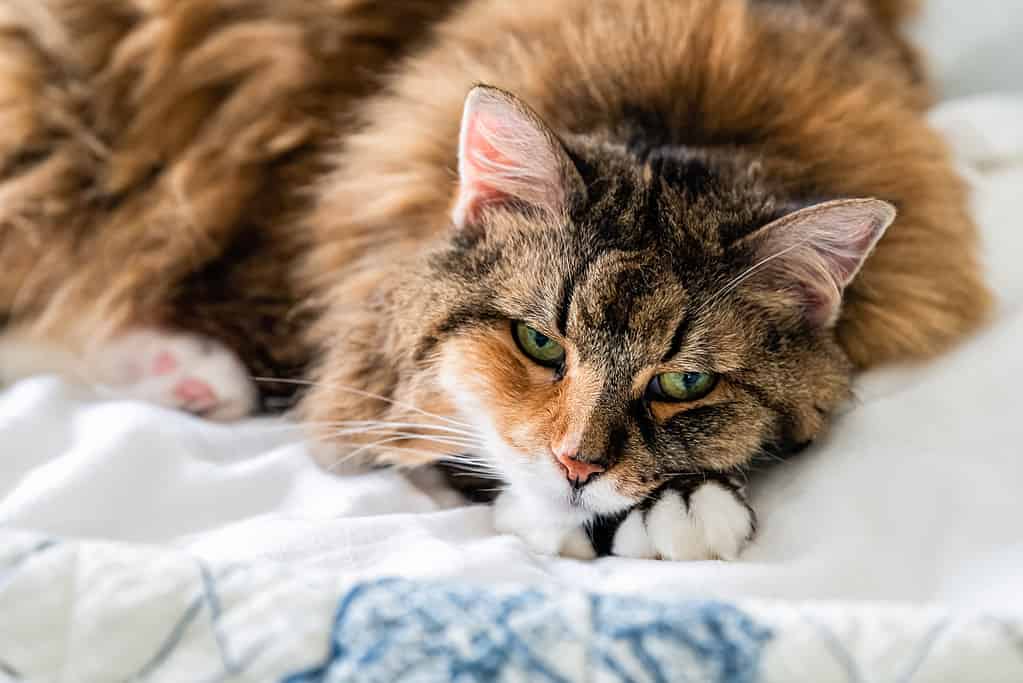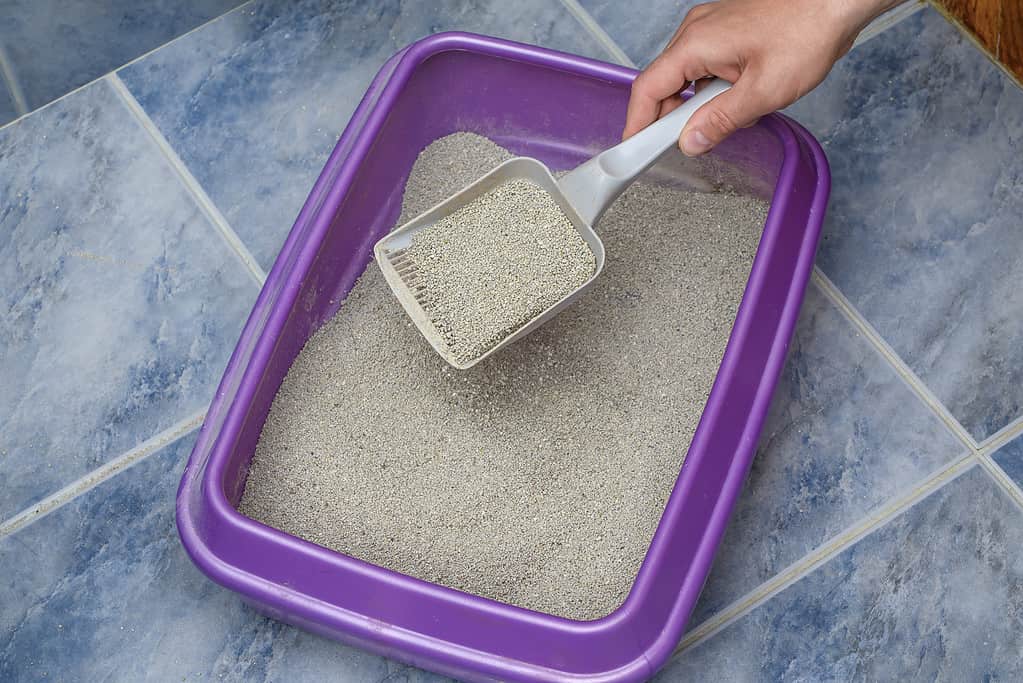Why did my cat poop on my bed? It’s an incredibly frustrating question for any cat owner to have to ask. No one wants to pull back the sheets after a long day and find a pile of cat feces waiting for them. Unfortunately, your cat can’t tell you exactly why it’s behaving this way. Luckily, there are a few common reasons cats poop outside their litter boxes – and no, it’s not to be mean to their owners. Read on to discover the top reasons your cat may be pooping on your bed and how to prevent it from happening again.
Why Did My Cat Poop On My Bed?: Top Reasons
There are a number of reasons why your cat might be pooping on your bed. The following list should help you narrow down potential causes for your cat’s behavior.
1. Your Cat Doesn’t Like Its Litter Box

Make sure the design of your cat’s litter box is suitable for its size and preferences.
©Lightspruch/iStock via Getty Images
Perhaps the most straightforward reason why your cat would decide to poop on your bed is that it doesn’t like its litter box. Not all litter boxes are created equal; different designs are intended to meet the needs of other cats. Consider whether the following aspects of your cat’s litter box are right for your feline companion:
- Size: Cats need plenty of room to do their business. If your cat is standing fully inside the litter box, but its rear end is still protruding, the box is too small.
- Type: Some cats can manage a hooded or top-entry litter box while others prefer an open model.
2. Your Cat Doesn’t Like the Cat Litter
Another potential reason your cat poops on your bed is your choice of cat litter. You should aim for a brand that’s soft and sandy without sharp chunks. This will make it easier on your cat’s paws. Also, if you have a scented cat litter, make sure the smell isn’t repulsive to your cat.
3. The Cat Litter Is Dirty

Dirty kitty litter can make your cat reluctant to use its litter box, which can lead to cat feces in your bed.
©Natasha Zakharova/Shutterstock.com
Needless to say, you should be changing the cat litter and cleaning the litter box on a regular basis. This means scooping out the clumps on a daily basis and replacing the entire batch of litter every two to four weeks. If more than one cat uses the box, you may have to do it more often. Do yourself a favor and purchase a scooper specifically designed for cat litter! You may also want to invest in a self-cleaning litter box.
4. The Litter Box Is In the Wrong Place
It’s possible that your cat doesn’t like the location of its litter box. Just like humans, most cats prefer privacy when doing their business. Try moving the box out of high-traffic areas and into a quiet corner free of obstacles.
5. You Don’t Have Enough Litter Boxes
Ideally, each cat should have its own litter box. Cats are very fastidious when it comes to their toilet habits and can get quite territorial. If you have more than one cat, make sure each one has access to a separate litter box.
6. Your Cat’s Environment Or Routine Has Changed

Changes in environment or other stressors can cause your cat to poop outside its litter box.
©krblokhin/iStock via Getty Images
Generally speaking, cats don’t enjoy change. Common life changes like a move, a new family member, or a new pet can cause your cat to act out. If your cat is having difficulty transitioning to a new situation, try maintaining as much consistency in the new routine as possible and supplying comforts like familiar toys or foods.
7. Your Cat Is Stressed
Stress is one of the most common reasons cats poop outside their designated litter box. Besides changes to its living environment, there are plenty of other reasons your cat might be stressed. These include tension with humans or other pets in the household, separation anxiety, or alterations to its diet.
8. Your Cat Is Sick
Illness is a common reason cats poop on their owners’ beds. If you think your cat might be sick, it’s best to follow up with your veterinarian immediately. Although the cause could be something as relatively minor as allergies, it could also be something more serious.
How to Prevent Your Cat from Pooping On Your Bed

Keeping your cat’s litter box clean will encourage it to use the box instead of pooping on your bed.
©Pawel Kacperek/iStock via Getty Images
There are a few things you can do to prevent your cat from pooping on your bed. These include:
- Purchasing a suitable litter box and cat litter
- Maintaining the cleanliness of your cat’s litter box
- Making sure every cat in the home has access to its own litter box
- Eliminating stressors around the home
- Taking your cat to the vet for a checkup to eliminate the possibility of illness
- Using a pet-safe cat deterrent on your bed (either a spray or scents like peppermint or orange)
Remember that your cat is not pooping on your bed to be bad! Punishing it for this type of behavior is counterproductive and may actually make the situation worse. The most effective way to prevent it from happening is to diagnose the root cause and deal with it promptly.
Summary Table: Why Did My Cat Poop On My Bed?
| Number | Reason |
|---|---|
| 1 | Your cat doesn’t like its litter box |
| 2 | Your cat doesn’t like the kitty litter |
| 3 | The kitty litter is dirty |
| 4 | The litter box is in the wrong place |
| 5 | You don’t have enough litter boxes |
| 6 | Your cat’s environment has changed |
| 7 | Your cat is stressed |
| 8 | Your cat is sick |
Conclusion
Possible reasons why your cat is pooping on your bed include litter box issues, environmental changes, stressors, and illness. If you find that you still can’t figure out why your cat is engaging in this type of behavior, it’s best to consult with your veterinarian to pin down the cause.
Thank you for reading! Have some feedback for us? Contact the AZ Animals editorial team.








